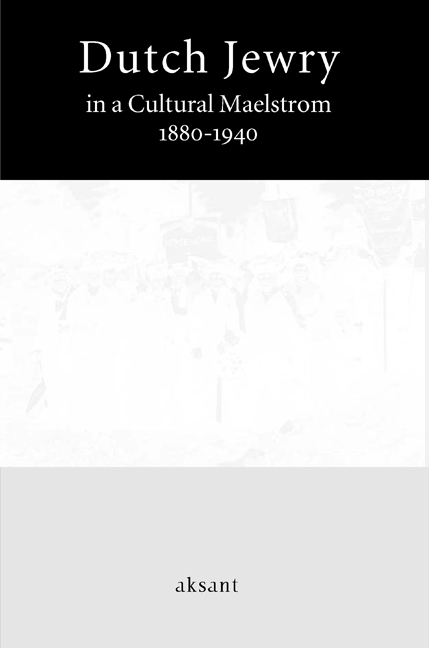Book contents
- Frontmatter
- Contents
- Foreword
- The New “Mosaik”: Jews and European Culture, 1750-1940
- The Politics of Jewish Historiography
- “The First Shall be the Last”: The Rise and Development of Modern Jewish Historiography in the Netherlands Until 1940
- Epigones and Identity: Jewish Scholarship in the Netherlands, 1850-1940
- Judaism on Display: The Origins of Amsterdam's Jewish Historical Museum
- De Vrijdagavond as a Mirror of Dutch Jewry in the Interbellum, 1924-1932
- “Holland is a Country which Provokes Serious Reflection…”: Images of Dutch Jewry in the German Jewish Press
- Spinozism and Dutch Jewry between 1880 and 1940
- Spinoza's Popularity in Perspective: A Dutch-German Comparison
- Mozes Salomon Polak: Jewish “Lerner” and Propagator of Freemasonry, Spiritualism, and Theosophy
- Jewish Women, Philanthropy, and Modernization: The Changing Roles of Jewish Women in Modern Europe, 1850-1939
- Roosje Vos, Sani Prijes, Alida de Jong, and the others: Jewish Women Workers and the Labor Movement as a Vehicle on the Road to Modernity
- Stemming the Current: Dutch Jewish Women and the First Feminist Movement
- Dutch Jewish Women: Integration and Modernity
- Index of Names of Persons
- Index of Subjects
The New “Mosaik”: Jews and European Culture, 1750-1940
Published online by Cambridge University Press: 26 January 2021
- Frontmatter
- Contents
- Foreword
- The New “Mosaik”: Jews and European Culture, 1750-1940
- The Politics of Jewish Historiography
- “The First Shall be the Last”: The Rise and Development of Modern Jewish Historiography in the Netherlands Until 1940
- Epigones and Identity: Jewish Scholarship in the Netherlands, 1850-1940
- Judaism on Display: The Origins of Amsterdam's Jewish Historical Museum
- De Vrijdagavond as a Mirror of Dutch Jewry in the Interbellum, 1924-1932
- “Holland is a Country which Provokes Serious Reflection…”: Images of Dutch Jewry in the German Jewish Press
- Spinozism and Dutch Jewry between 1880 and 1940
- Spinoza's Popularity in Perspective: A Dutch-German Comparison
- Mozes Salomon Polak: Jewish “Lerner” and Propagator of Freemasonry, Spiritualism, and Theosophy
- Jewish Women, Philanthropy, and Modernization: The Changing Roles of Jewish Women in Modern Europe, 1850-1939
- Roosje Vos, Sani Prijes, Alida de Jong, and the others: Jewish Women Workers and the Labor Movement as a Vehicle on the Road to Modernity
- Stemming the Current: Dutch Jewish Women and the First Feminist Movement
- Dutch Jewish Women: Integration and Modernity
- Index of Names of Persons
- Index of Subjects
Summary
…ich meine den reinen Mosaik-Gottesdienst, mit orthographischen deutschen Gesängen und gerührten Predigten, und einigen Schwärmereichen, die eine Religion durchaus nötig hat.
Heinrich Heine, Reisebilder. Italien 1828. Die Bäder von Lucca.That the relationship of Jews to European culture has been and continues to be a vexed topic should come as no surprise: as a principal piece of the history of the Jews in European society it could not be otherwise. Yet in some ways the subject has been even more fraught than one might expect. The cultural question has served as a lightning rod for all the problems inherent in the last three centuries of European Jewish history. Take any of the central issues of modern Jewish history – emancipation, anti-Semitism, assimilation – and you will find that some of its most pointed expressions or controversial manifestations were in the realm of culture.
In this paper I will focus on the way in which the relationship of the Jews to European culture has been subsumed to the category of assimilation and survey some alternative approaches. I need hardly remind the reader that the category of assimilation has held pride of place in the interpretation of Jewish life in general – and European Jewish culture in particular – since at least the closing decades of the nineteenth century. While at an earlier point in time one might have said that the category's preeminent position was for better or for worse, it is now fair to say that in regard to the Jews and European culture it is overwhelmingly and unequivocally for the worse.
EUROPEAN JEWISH CULTURE AS ASSIMILATION
The origins of the concept of assimilation were decidedly polemical: it emerged at the end of the nineteenth century as an indispensable weapon in the intramural warfare between the proponents of liberal and post-liberal or nationalist Jewish ideologies, as well as in the sectarian warfare among the multiple strains of nationalism. It was a nationalist construct whose proponents first and foremost posited an uncompromising notion of the purity of “national” or religious culture. They understood culture in essentialist terms: national cultures were rooted in divisions both ontological and sociological.
- Type
- Chapter
- Information
- Dutch Jewry in a Cultural Maelstrom, 1880-19401880-1940, pp. 11 - 30Publisher: Amsterdam University PressPrint publication year: 2008

